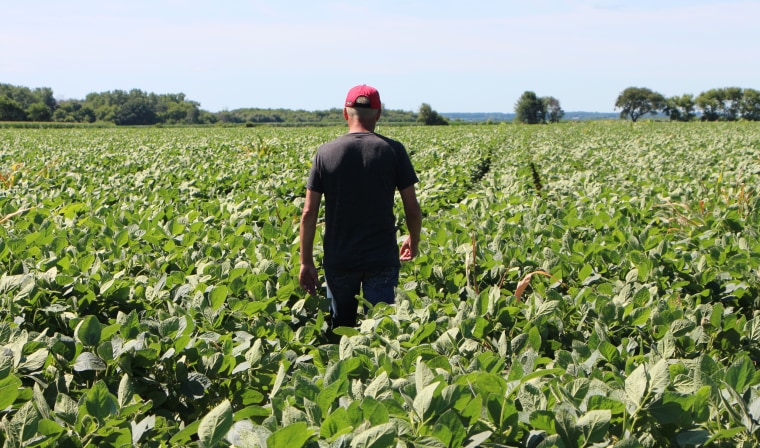Rives Neblett has farmed grain, soybeans and corn in the Mississippi Delta for decades, but after the past year he’s asking himself how much longer he can keep his operation going.
The longtime farmer owns 6,000 acres on which he produced approximately 450,000 bushels this past year. But, because of falling prices directly driven by President Donald Trump’s trade wars, Neblett faces two unpleasant choices: He can either take a massive loss by accepting the bailout money that the White House offered as part of a $12 billion package to farmers — an opportunity the administration capped at $125,000 per farmer — or face an inhospitable market price at a two-decade low.
Neblett said some of his neighbors on smaller farms were able to recoup their losses through the bailout, but his decision to take the bailout money meant that he "lost his shirt."
Ultimately, the trade disagreements the bailout is meant to address have made a particularly difficult year for farmers even worse.
“Now we’re going into the new year, tariffs still have our prices down and we have to go to a bank to borrow money on a farm showing a loss,” Neblett said. “We’re not bankable. The Trump administration has no concern about what happens next year. It’s only about what won the midterms.”
Neblett said that he’ll be able to get a loan because he can borrow against his land. But there are many others — especially those farmers who rent their land — who won’t be as fortunate in the upcoming year.
“We can’t afford short-term, short-sighted politics,” Neblett said.
Prior to the tariffs in February, the U.S. Department of Agriculture predicted that net farm income would hit a 12-year low — dropping 6.7 percent from 2017. Because of the Trump administration’s trade tactics, the Congressional Research Service concluded in a report published earlier this month that national net farm income dropped by more than $9 billion, or 12 percent.
Government payments to farmers, meanwhile, are up nearly 18 percent largely in direct response to the trade dispute with China, which accounts for nearly $4.6 billion of the $13.6 billion in payments. That is the highest amount the government has paid since 2006, according to the CRS report.
“The price of commodities have been declining for four or five years,” said Zack Clark, the director of government relations at the National Farmers Union. “That would’ve been a normally bad economy for farmers, but then the trade disputes and a lot of foreign contracts drying up drove down the price of commodities even further.”
And that's left some farmers wondering if they can even stay in a business that is tied very deeply to their families.
Even in cases of dairy and livestock, farmers continue to see diminishing returns leaving them few options to continue family businesses that in some cases go back generations.
"We’ve had five consecutive years of low net farm income, and so what you see is a lot of farmers and ranchers finding themselves in a position now where they’ve gone through a lot of their equity in recent years and have had to decide whether to continue in the business," said John Newton, the chief economist of the Farm Bureau.
Farmers and farm advocacy groups tend to agree, however, that China has been a bad faith actor in trade, and so most believe that there was a need to hold the country accountable.
"I think farmers want a quick resolution with China but understand it is important to get China to be good and fair trading partner," Newton said. "Folks are standing by the administration at this difficult time in hopes that things will be better."
But it's unclear how long this current Trump administration tactic can continue.
Though many hope the situation with China and other trade partners will change, farmers can’t afford to continue to take it on the chin, said Tom Nassif, the president and CEO of Western Growers Association.
“At a point you have to say when enough is enough,” Nassif said. “If it bleeds into 2019, we have to look at better ways to help the industry.”
Nassif also mentioned a need for the administration to reverse their immigration focus, as many farm workers who have lived in the United States for years fear arrest and deportation.
Farm lobbyists were unable to push immigration policies beneficial to the agriculture industry across the finish line this year, but they did score a win with the passage of the Farm Bill, which the president signed this past week.
Farm advocacy groups are largely pleased with the legislation, citing its preservation of farm risk management tools and trade aid programs.
But some farmers, like Neblett, remain concerned that it ignores the realities of farming and the new need for farms to grow or die.
“These days in agriculture, to be profitable and survive, you have to get bigger and bigger," he said. "To be honest, sometimes it seems like the government doesn’t understand how agriculture actually works in the field.”




